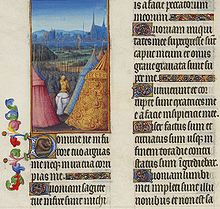Psalm 37
| Psalm 37 | |
|---|---|
| "A psalm of David" | |
 Manuscript of Psalm 37 | |
| Other name | |
| Text | by David |
| Language | Hebrew (original) |
Psalm 37 is the 37th psalm of the Book of Psalms. It has the form of an acrostic Hebrew poem,[1] and is thought to have been written by David in his old age.[2] In the slightly different numbering system used in the Greek Septuagint and Latin Vulgate translations of the Bible, this psalm is Psalm 36.
Interpretation[]
Psalm 37 is a response to the problem of evil, which the Old Testament often expresses as a question: why do the wicked prosper and the good suffer? In the New American Bible, Revised Edition, published by the Catholic Church in the USA, the psalm answers that this situation is only temporary: God will reverse things, rewarding the good and punishing the wicked here on earth.[1] This interpretation is shared by Protestants. Matthew Henry calls it David's call to patience and confidence in God by the state of the godly and the wicked.[3] Charles Spurgeon calls it "the great riddle of the prosperity of the wicked and the affliction of the righteous".[2]
It is written as an acrostic and divided into discrete sections. Each section ends with God's resolution of the question.[2]
The psalm has also been understood as a prayer of the persecuted who has taken refuge in the temple or figuratively of refuge in God. The psalm concludes with a plea to God for those who honor him, to bless them with his justice and to protect them from the snares of the wicked.[4]
The theme of inheriting the land reoccurs five times in this Psalm (in verses 9, 11, 22, 29 and 34). Prior to this in Psalm 25:13 the rich as also said to inherit the land as well. Albert Barnes also compares the wicked being cut off in psalm 37:2 and 10 with the wicked being cut off in Psalm 73:27.[5]
Uses[]
Judaism[]
- Verse 21 is found in Pirkei Avot Chapter 2, no. 14.[6]
- Verse 25 is part of the final paragraph of Birkat Hamazon.[7]
New Testament[]
The Beatitudes in the New Testament are influenced by this psalm.[8] Verse 11 was cited by Jesus Christ in Matthew 5:5. The original reads,
- But the meek shall inherit the earth;
- and shall delight themselves in the abundance of peace.[9]
Islam[]
Psalm 37:29 "The righteous shall inherit the land, and dwell therein for ever" is referenced in the Qur'an:[10]
Before this We wrote in the Psalms, after the Message (given to Moses): "My servants the righteous, shall inherit the earth."
Book of Common Prayer[]
In the Church of England's Book of Common Prayer, this psalm is appointed to be read on the evening of the seventh day of the month.[12]
Musical Settings[]
Verses 30–31 in Latin were set by Anton Bruckner as "Os Justi" in 1879.
See also[]
References[]
- ^ a b New American Bible, Revised Edition, Note on Psalm 37, accessed 21 March 2021
- ^ a b c Charles H. Spurgeon, Treasury of David (The Sword and the Trowel Magazine, 1885)
- ^ Matthew Henry’s Concise Commentary
- ^ Stuttgarter Erklärungsbibel. ISBN 3-438-01121-2, 2. Aufl. 1992, Deutsche Bibelgesellschaft Stuttgart, p.691f
- ^ "Psalm 37 Barnes' Notes".
- ^ The Complete Artscroll Siddur, page 555
- ^ The Complete Artscroll Siddur, page 195
- ^ Confraternity of Christian Doctrine, Inc., Footnote b at Psalm 37 in the New American Bible Revised Edition
- ^ Psalm 37:11
- ^ "Psalms - Oxford Islamic Studies Online". www.oxfordislamicstudies.com. Retrieved 2018-07-26.
- ^ Quran 21:105 (Translated by Yusuf Ali)
- ^ Church of England, Book of Common Prayer: The Psalter as printed by John Baskerville in 1762, pp. 196ff
External links[]
| Wikimedia Commons has media related to Psalm 37. |
- Psalms
- Works attributed to David